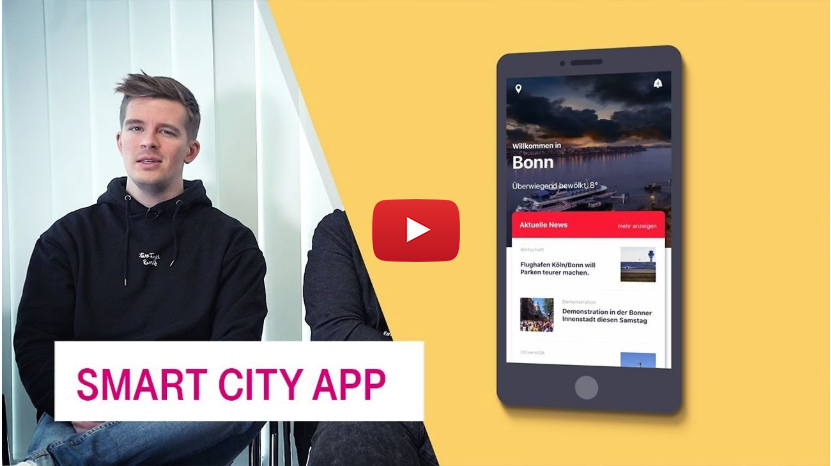02-27-2019 Nadja Kirchhof
- A healthier urban climate with smart greenery
- Efficient and environmentally friendly building management
- AI-supported traffic management reduces emissions and congestion
- Developer Community designs Smart Cities App for the public sector

Sustainable smart cities are the bedrock of digital society.
Sustainability comes first - this is what Deutsche Telekom is demonstrating at MWC19 Barcelona. Smart City is one of the company’s core themes this year. Citizen-friendly, digital service offerings, a smart "green lung" doubling up as a piece of furniture or the use of artificial intelligence to eliminate traffic jams and emissions: more convenience for citizens that can be experienced directly in everyday life. Markus Keller, head of Smart City at Deutsche Telekom, says: "We are responding to feedback from the administrations. We assume responsibility together with the cities and strong innovation partners. Our goal is a sustainable, future-oriented digital society."
CityTree: Clever green lung
A place to chill out with a hotspot, but please in fresh air: the CityTree improves air and promotes the digital infrastructure in cities. This smart piece of furniture from startup Green City Solutions works as a biological air filter in outdoor areas. IoT technology combines nature's capabilities with a simple and intelligent connection. Planted moss is automatically supplied with water and nutrients and filters fine dust particles and nitrogen oxides from the air. The CityTree is an ideal natural air purifier and the air circulation can be regulated by built-in fans. The integrated sensors also provide comprehensive information on the environmental performance and status of the CityTree. The maximum output is just under 700,000 m3 of air per day and is comparable to the air volume of 180 hot-air balloons.
Live exhibit: The trade fair booth that measures itself
The entire Deutsche Telekom booth at MWC19 Barcelona will itself become an exhibit: The Building Monitoring and Analytics solution will be shown live in its exhibition area. Numerous built-in sensors indicate which displays are particularly popular with visitors at any given time and show the stream of visitors moving across the booth. Building monitoring opens up new possibilities for architects, entrepreneurs and managers. Unused workplaces, as well as trends and preferences in space use, offer potential for developing new working environments or saving energy. Another very practical advantage: only a room that is actually used is cleaned at the end of the day. The data transmitted, including air quality, lighting conditions, open windows or doors, can be analyzed and evaluated. The connection of the sensors to the IoT platform "Connected Things Hub", supported by Axonize, serves this purpose.
Traffic jam? AI to the rescue!
No Smart City without intelligent traffic control. Deutsche Telekom is also developing solutions for this area, e.g. at Ernst-Reuter-Platz in Berlin. The intersection has always been a neuralgic place for urban traffic planners. In the research project by Telekom Innovation Laboratories (T-Labs), urban traffic flow is optimized using artificial intelligence (AI). Five cameras installed at the intersection first capture a "pixel stream". Machine learning, a form of AI, is then used for pattern recognition: the measured data is recognized as cars and trucks. Optimized as a model for different times of the day, a recommendation is made for traffic light control. The result is astounding: the T-Labs pilot project reduces congestion phases by up to 20 percent, a real peak value. A promising approach that not only saves motorists time, but can also significantly contribute to improving air quality in the city.
Developer Community creates tailor made smart city services
The Online Access Act poses a huge challenge to cities and municipalities: by 2022, standard administrative services such as driving license and passport applications will have to be available online. Deutsche Telekom and the German Association of Towns and Municipalities (DStGB) are jointly supporting those responsible in the administrations with the development and implementation of digital services. Simple, citizen-friendly, standardized: these are the most important success criteria to convince both sides, administrations and citizens, of the benefits of digitization and also to meet their expectations. The foundation stone was laid last year with the Smart Cities App. The location-based app bundles digital services for the public sector such as registration of residence, driving license applications or car and bike sharing. It also provides information on leisure activities and shopping opportunities.
Deutsche Telekom is calling on cities and municipalities to join the Developer Community at MWC19 – the cities of Bonn and Dortmund have just come aboard today. Challenges such as scarce resources, legal requirements and ongoing regular operations can be mastered more easily together.
Learn more about Smart Cities App with Deutsche Telekom Netzgeschichten
Visit Deutsche Telekom’s booth in hall 3 at MWC in Barcelona from February 25 to 28 to experience our products and services live.
Email Newsletters
Sign up to receive TelecomTV's top news and videos, plus exclusive subscriber-only content direct to your inbox.




